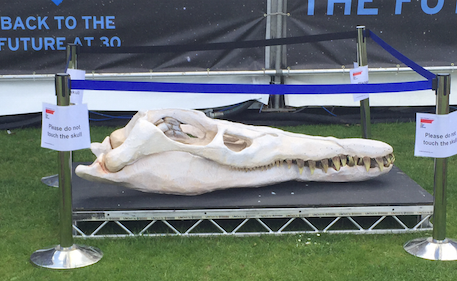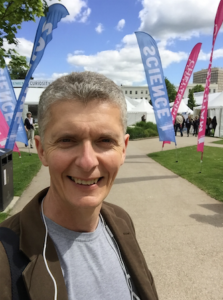I have a deep interest in maintaining my own health, fitness and well being and in doing so have discovered information, ideas, tips, tricks and techniques along the way that I would like to share with you. In this special edition I am going to look at what was on offer at the 2015 Cheltenham Science Festival for those interested in in looking after their health. I have recorded a special one off podcast that you can either play directly from here now or download to your own device and play later.
Listen to the podcast here now
or download the file from here and listen to it later
Now the Science Festival here in Cheltenham is an annual celebration of how the world works and how science helps us to understand it. Spread over 6 days its aim is to inspire, challenge, surprise and entertain. This year (2015) the focus is on all things dinosaur but with the Universe, Back to the Future and Life being the three other big topics, I am sure there is going to be something about health in amongst the tyrannosaurus rex fossils, De Lorian Sports cars and big telescopes.
Now thumbing through the programme of sessions and presentations being given each day, the organisers have helpfully identified which of the four major topic areas each session falls into but additionally they have also sub-categorised each. And by looking through the programme I can clearly see lots of “Health” related sessions.
Now my first visit to the festival is on the second day so lets have a quick look to see what I missed yesterday. Well there was a session about our friendly bacteria, one about Treating Mental illness. Now that is a huge topic today I shall be attending a session on a related subject – but more about that later.
Immunotherapy and cancer treatment was also covered looking at whether we could us our own immune systems to fight cancer. Now that is a fascinating topic that I am sorry to have missed. And the only other Health related presentation yesterday was one about the disproportionate impact a tiny cluster of our genes have on defining who we are.
Now today The first session I am going to attend is about the impact your life has on your genes. Let me go to that one and I will tell you all about it afterwards.
Epigenetics
So the first Session I attended in the dimly lit Pillar Room in Town Hall in Cheltenham was called How Your Life Affects Your Genes and served as an introduction to the field of Epigenetics. No me neither! So I had to do a bit of research to find out what epigenetics was. Thank heavens for the research scientists most trusted source which is of course Wikipedia
Wikipedia says epigenetics is the study of cellular physiological trait variations not caused by changes in the DNA sequence. In layman’s terms epigenetics is essentially the study of external or environmental factors that turn genes on and off, and effect how cells read Genes.
So the promise of this session was that the way you and I choose to run our lives can and will affect not only our health but the health of our children and children’s children too.
Recent history has given us clues that this may be the case. The speakers (who included environmental health scientists and biologists) shared the findings of the Dutch Famine Study. At the end of World War 2 food stocks in the Netherlands rapidly ran out which meant adult rations dropped considerably.
As you would expect, women who were pregnant at this time gave birth to smaller babies. However what was also revealed was that those children who grew up and had children themselves were thought to give birth to smaller babies as well, suggesting that the famine experienced by the mothers caused some kind of epigenetic changes that were passed down to the next generation.
Similarly, Pakistani immigrants to the UK who back in their country may have had low incidences of diseases, took on the characteristics of the demographics of the UK in terms of higher rates of those same diseases. So the inference here is that the environment plays a huge part in the quality of your health.
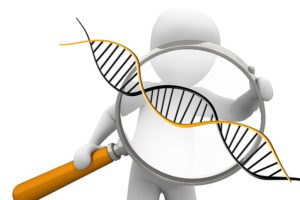 Of course these things are never simple and straightforward and so there are always going to be a range of factors in what is called the Exposome, which is completely unique to you and is the totality of your human environment from the moment you are conceived.
Of course these things are never simple and straightforward and so there are always going to be a range of factors in what is called the Exposome, which is completely unique to you and is the totality of your human environment from the moment you are conceived.
Factors such as your diet, whether you exercise or not, the levels and types of stress you are under and your exposure to environmental conditions all play a part. The question Epigenetics poses is why should some people get a disease and others not. If the negative changes at the point at which the disease is triggered can be discovered and that process interrupted, it has profound possibilities for the future of our health.
The speakers touched on the nature or nurture argument and mentioned studies being done with identical twins who share the same DNA but who grew up in very different environments. These studies are very important to help understand the environmental impact on our health.
So the main message was that whilst genetics may be responsible for 20% of disease, environmental factors play a significant part in the quality of our health and perhaps more importantly there are many environmental factors that we can choose to control to enhance our health.
Perhaps the most telling comment for me came at the very end of the session when one of the speakers referring to your biochemistry said that “you really are what you eat”.
If ever there was a statement to encourage you to make more healthy choices for your diet, then that for me was it.
Pause For Thought
So that first session was a bit heavy and judging by the questions in the Q&A at the end the audience were very sophisticated. But it did give me confirmation that part of my own health regime, i.e. my diet has had official scientific endorsement today.
Now other session I could have gone to today on health was one about repairing the spine but as I am more about preventative health issues than remedial health topics I was especially delighted with the presentation I chose instead. I nearly didn’t get in but I will tell you about that when I report back on this session.
Mindfulness
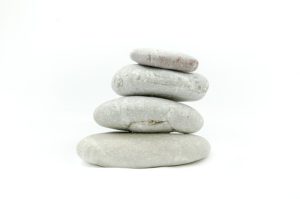 Now as I have a deep personal interest in mindfulness, I was really looking forward to Linda Blair’s session that was simply called Mindfulness. Linda is a practicing clinical psychologist who has written a number of books on the topic. The latest one being called the Key to Calm.
Now as I have a deep personal interest in mindfulness, I was really looking forward to Linda Blair’s session that was simply called Mindfulness. Linda is a practicing clinical psychologist who has written a number of books on the topic. The latest one being called the Key to Calm.
I was delighted when I saw this in the programme, but when I tried to book the session online it was full. But fortunately there were a number of ticket returns at the Box Office that allowed me access to this popular session.
A slim petite American lady Linda sat calmly, comfortably and confidently at the front of a packed room to give her thoughts on the challenges that we face in the 21st-century. Fundamentally, stress is the biggest problem and one that is getting worse for a number of reasons.
Information is a huge problem for us as human beings because our brains are just not designed to cope with so much in such a short space of time. Added to that, is much of the information we experience has a disproportionately negative bias.
We also live in a changing world, one that shifts and adjusts at a rate faster than we can cope with. Because we don’t know how to deal with this, we feel out of control, we feel fearful and often anger is used to mask those feelings.
Linda also explained that as a species we are feeling more and more isolated, even in this so-called connected world of ours. She gave a really useful explanation of why this is the case. Our thinking brain, the Pre Frontal Cortex is the part of the brain processing the information we send and receive via Facebook and Twitter and the other social media sites we use.
However the Amygdala is the part of the brain that helps us connect with people and for it to connect it needs to smell, touch and hear the voice of the person. And so the connection you are looking for when you pick up your phone to check your Facebook feed, you don’t get because smell, touch and to a certain extent sound, aren’t transmitted via technology.
And that is why we keep checking our phone.
Other challenges that we face that causes us stress include comparison with the unrealistic role models portrayed through the media, the commercialism confusion of focusing on wants rather than what we need, the idea that we need a lot of choice, ignoring our need to follow the natural cycle of night and day and the misguided belief that we can multi-task our way to productivity.
On this last point, Linda explained and then proved with an innovative live experiment that the brain can’t multitask. What ends up happening is you switch between tasks resulting in more mistakes, it will take longer and it has a negative effect of making us become more distract-able.
So when you combine all of those things, it is no wonder that we are so stressed.
Well what can we do about it? I won’t bore you with the various solutions Linda discounted because I think she was getting on a bit of a personal hobby horse with some of them.
I imagine it will come as no surprise to you that mindfulness came out as her recommendation. However to her credit she did say that Mindfulness isn’t a one stop shop and a cure all for stress but it is an extremely powerful first step to interrupting the onset of stress.
After spending a considerable amount of time telling us why mindfulness was needed Linda eventually came round to sharing with us the how.
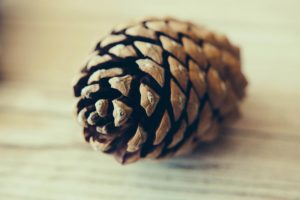 Earlier, as the audience had arrived for the session, the festival guides had encouraged each of us to pick up either a twig or a pine cone from the pile on the table in front of the stage. This was the process she took us through a two stage process, one she called Stop, Look and Listen:
Earlier, as the audience had arrived for the session, the festival guides had encouraged each of us to pick up either a twig or a pine cone from the pile on the table in front of the stage. This was the process she took us through a two stage process, one she called Stop, Look and Listen:
Step 1 – The first thing you do is stop whatever you are doing and focus on your breathing making sure you breathe in through your mouth and then out through the nose. Linda shared that when working with younger patients she has them imagine a butterfly on their back opening and closing its wings with the in and out breaths.
I tried that and it did help.
Step 2 – Then having calmed your breathing you pick up an object (this is where the pine cone I picked out earlier came in) and then examine it in detail. The important thing is to do it without judging – just observe it as it is.
It would be quite easy to skip over this instruction because it is so simple but the reality of it is that you do really need to look at something in the way for the full effect. It requires you to really notice every tiny detail with an intensity and concentration in a manner you probably haven’t look at something with since you were a young child
We all did this for a few minutes and it was incredibly calming and relaxing. There was a tendency for the mind to jump around a bit but it did start to settle if I focused on either the breathing or got even deeper into looking at the pinecone.
You could feel the calmness sweep across the room as the whole audience did this exercise and was a demonstration of how powerful it was. Linda explained that doing this will free the brain from the adrenaline surges associated with the stress reaction and return Dopamine and Serotonin to normal levels. It is a simple exercise… but it worked.
By doing this, not only will your stress levels reduce, but your memory will improve, as will your levels of concentration but more importantly, you will be better prepared to deal with whatever it is that is stressing you.
Now whilst I did find the brief mindfulness exercise beneficial, I was a little disappointed by this session because it was 90% on why we are stressed and only 10% on what we can do about it. I was hoping that the proportion would have been the other way round.
Still it was a useful reminder for me from a recognised expert about how important being mindful is for our health and well being.
More from the 2015 Cheltenham Science Festival here.
